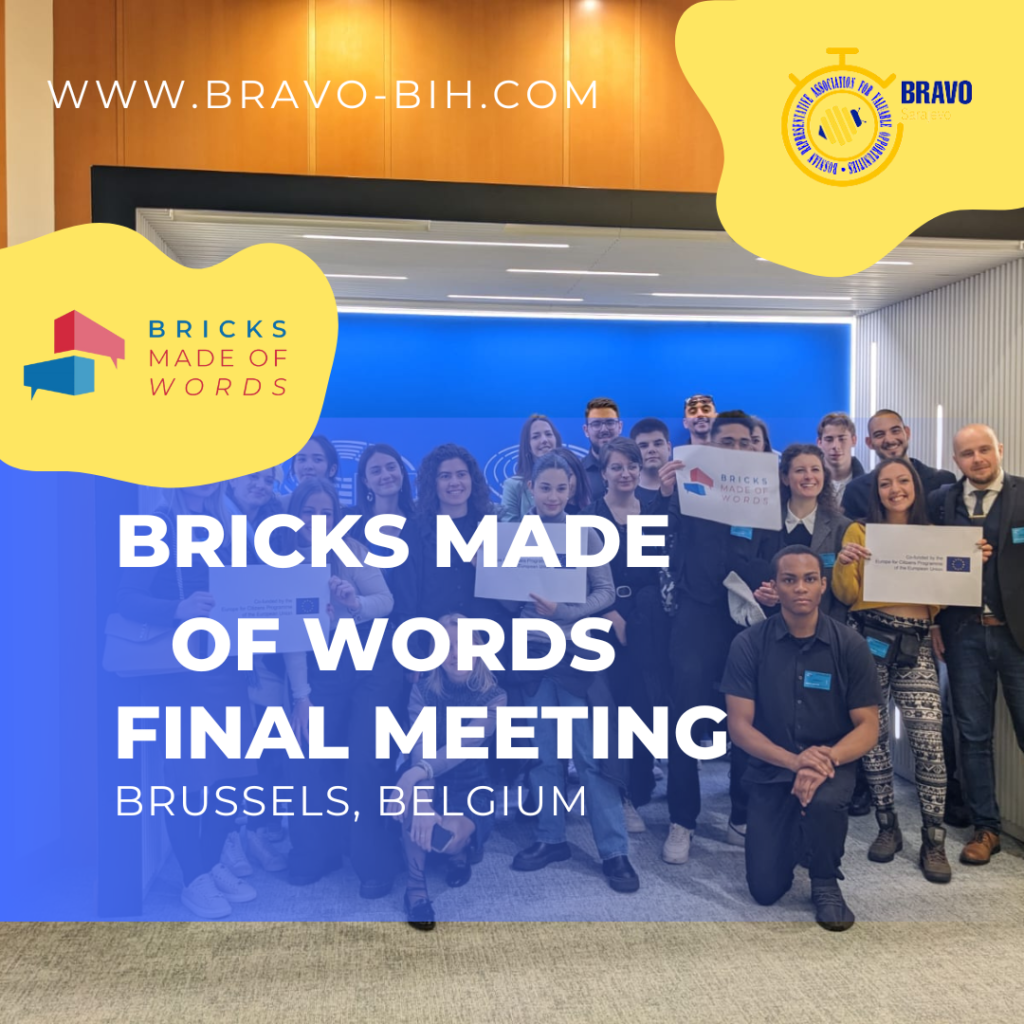
The Bosnian delegation, representing Bosnian Representative Association for Valuable Opportunities was in Brussels for the last meeting of the The Bricks Made of Words project, co-financed by the EU’s program “Europe for Citizens”.
Young people from different European countries (Portugal, Romania, Cyprus, Serbia, Italy and Bosnia and Herzegovina) concluded their journey which lasted several months. During the various stays the young people, through laboratories, workshops and guided tours tried to develop critical thinking on memory, history, environment, immigration, and rights, and through the debate and different opinions they finally produced a document with ideas and suggestions which was presented in Brussels, to the representatives of the EU, on the 29th of March during the last event of the project.
During the mobilities in all countries, they addressed various issues, such as the history of the massacres in Italy or immigration in Bosnia so they reflected on what they saw, highlighted some problems, trying to make their point prevail. All the team’s opinions were collected and in the end, were included in a document that was specifically illustrated to the two MEPs, the Spanish Javier Moreno Sánchez, and the Italian Beatrice Covassi, inside the European Parliament building in Brussels. The participants presented the progress of the project, telling their experiences and then they presented the document with their impressions and suggestions to the two MEPs who listened to them and gave their opinions and promised to take charge of their request.
This was a beautiful journey and a strong emotion for the Bosnian team and the whole association, so a huge thanks for the outstanding opportunity received, for the experience they had and the friendships created.
More about THE BRICKS project:
The BRICK (Building Respect, Inclusion and Communication Knowledge) project is a European initiative that aims to promote social inclusion and intercultural dialogue among young people. The project brings together young people from different backgrounds to share their experiences, ideas, and perspectives on various social issues.
The BRICK project is co-funded by the European Union’s Erasmus+ program, and it is implemented by a consortium of partners from Italy, Romania, Greece, Portugal, and Spain. The project involves various activities, such as workshops, cultural events, training sessions, and exchanges, and it is designed to promote the active participation of young people in the development of their communities.
One of the main objectives of the BRICK project is to promote social inclusion and combat discrimination and stereotypes. The project aims to foster mutual understanding and respect among young people from different backgrounds and to promote the values of diversity and tolerance. Through various activities, the project encourages young people to develop critical thinking, creativity, and teamwork skills, which are essential for active citizenship.
The BRICK project is also focused on promoting intercultural dialogue and cooperation among young people from different European countries. The project provides a platform for young people to exchange ideas, experiences, and best practices, and to learn from each other. By promoting intercultural dialogue, the project aims to build bridges between communities and to foster a sense of belonging to a shared European identity.
The BRICK project has been implemented in several European countries, and it has involved hundreds of young people from different backgrounds. The project has received positive feedback from participants and has been recognized as an example of good practice in promoting social inclusion and intercultural dialogue among young people.
In conclusion, the BRICK project is a valuable initiative that aims to bring young people together to build a better future. By promoting social inclusion, intercultural dialogue, and active citizenship, the project is helping to create a more diverse, tolerant, and united Europe. The BRICK project is a shining example of how young people can be the driving force behind positive change in their communities and beyond.
